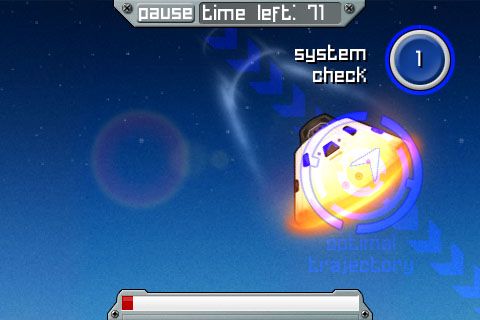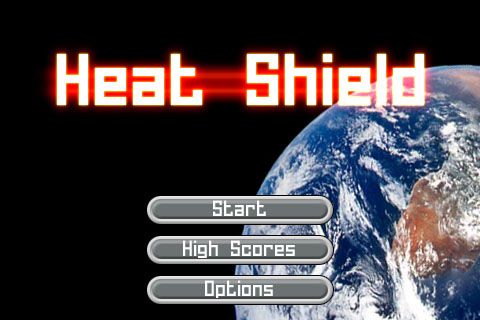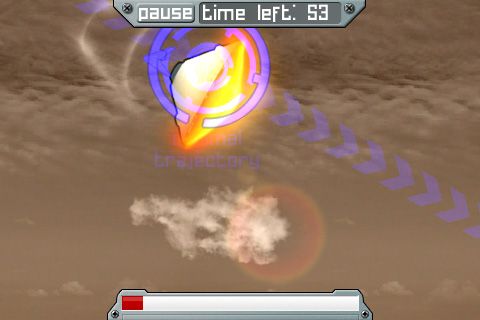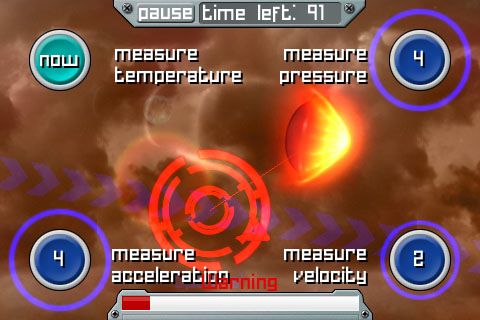Retro Replay Review
Gameplay
Heat Shield’s gameplay centers on a deceptively simple control scheme: you tilt your iPhone or iPod touch to guide spacecraft through the deadly gauntlet of atmospheric entry. What begins as an accessible tutorial mission quickly evolves into a precision-based challenge, as you learn to manage speed, angle, and thermal loads. The tilt controls are responsive and offer just enough feedback to convey the tension of re-entry without overwhelming casual players.
(HEY YOU!! We hope you enjoy! We try not to run ads. So basically, this is a very expensive hobby running this site. Please consider joining us for updates, forums, and more. Network w/ us to make some cash or friends while retro gaming, and you can win some free retro games for posting. Okay, carry on 👍)
The variety of vessels at your disposal keeps each mission feeling fresh. Flying an Apollo command module into Earth’s atmosphere requires a controlled, shallow descent to prevent burning up, whereas piloting the Space Shuttle demands balance between lift and drag. When you switch to the Spirit and Opportunity Mars rovers, the focus shifts from fiery re-entry to delicate landing on the Red Planet’s surface. Each craft’s distinct handling profile adds depth, encouraging you to master multiple control styles.
Missions span the solar system, from returning to Earth’s blue skies to braving the crushing atmosphere of Venus, the churning storms of Jupiter, and the frigid haze of Saturn’s moon Titan. This breadth of environments introduces new gameplay wrinkles—higher atmospheric density on Venus requires tighter angle control, while Titan’s thin atmosphere forces slower speeds and careful descent. The game’s mission structure delivers a steady learning curve, with difficulty ramps that reward patience and experimentation.
Online leaderboards inject a competitive edge, challenging you to shave off precious seconds and perfect your entry corridors. Each replay feels purposeful, as you tweak your approach to climb global rankings. The absence of an overly complex HUD keeps you focused on the essential data: current speed, altitude, and heat gauge, making every mission feel like a true test of skill rather than a busy tutorial.
Graphics
Heat Shield may run on mobile hardware, but it presents a clean, atmospheric aesthetic that captures the drama of spaceflight. Planetary backgrounds feature subtle gradients and motion, conveying the sensation of traveling through vast layers of atmosphere. Whether you’re peering out at Mars’s rusty sky or Venus’s sulfur-yellow haze, each celestial backdrop feels distinct and immersive.
The vehicles themselves are rendered with crisp silhouettes and minimalistic shading. While you won’t see hyper-detailed textures on the shuttle’s tiles, the recognizable outlines ensure instant identification under pressure. Visual cues—like the glowing re-entry plasma enveloping your heat shield—are both functional and dramatic, warning you when you’re angling too steeply or moving too fast.
UI elements are kept to a minimum, letting you concentrate on the flight path. The speedometer and heat gauge float unobtrusively at the screen edges, while indicator arrows point you toward your intended landing zone. These design choices maintain immersion, preventing information overload and preserving the cinematic feel of atmospheric entry.
Even in high-stress moments, Heat Shield’s performance remains rock solid. Animations are smooth, and frame rates rarely dip, ensuring that tilt controls respond instantly. On Retina-class screens, the vibrant atmosphere effects and crisp vessel outlines truly shine, proving this simulator is more than just a backbone of physics—it’s also a testament to polished mobile visuals.
Story
Heat Shield doesn’t weave a traditional narrative with cutscenes or characters, but it tells a story through its missions and historical context. Piloting the Apollo command module instantly evokes memories of NASA’s golden age of exploration, while the inclusion of Mars rovers honors modern robotic pioneers. Each vehicle feels like a chapter in humanity’s ongoing quest to conquer the skies and beyond.
The implicit story unfolds as you progress through increasingly exotic atmospheres. Your first successful splashdown in the Pacific Ocean carries the triumph of early space missions; your safe touchdown on Titan speaks to the frontier spirit of exploring alien worlds. This subtle progression provides a sense of purpose, transforming technical challenges into narrative milestones.
Heat Shield’s missions serve as vignettes that invite reflection on real-world spaceflight achievements. There’s no forced drama or manufactured stakes—just a respectful nod to the perils of re-entry and landing. This understated approach allows players to project their own sense of wonder onto each descent, making victories feel personal and earned.
While hardcore sim fans might crave deeper lore or voiceovers, the minimalist storytelling aligns perfectly with the game’s focus on pure atmospheric entry. By stripping away unnecessary exposition, Heat Shield maintains a laser focus on the visceral thrill of guiding a fragile craft through hostile skies, letting the environment and authentic vehicle models carry the narrative weight.
Overall Experience
Heat Shield delivers a tight, focused experience that stands out in the crowded mobile market. It reframes atmospheric entry as an engaging puzzle, blending realistic physics with intuitive tilt controls. The learning curve is steep enough to keep you invested, yet accessible enough for a quick play session on the go.
The mission variety—from Earth re-entries to interplanetary landings—ensures you never tire of the core loop. Each atmosphere demands new strategies, and replaying earlier missions for leaderboard glory adds significant replay value. The minimalist presentation and stable performance further enhance the pick-up-and-play appeal, making it a perfect fit for both casual gamers and space enthusiasts.
Heat Shield also shines as an educational tool, offering insights into orbital mechanics and airflow dynamics without resorting to jargon. By experiencing the challenges firsthand, players develop an intuitive understanding of how re-entry angles and heat loads correlate. This makes the game especially appealing to students, educators, and anyone with a curiosity about space travel.
In summary, Heat Shield is a finely tuned simulator that captures the thrill and peril of atmospheric entry. Its elegant controls, varied missions, and respect for historical context combine to create an experience that’s both entertaining and enlightening. Whether you’re chasing leaderboard fame or simply seeking a unique mobile game, Heat Shield delivers a rewarding journey through the skies and beyond.
 Retro Replay Retro Replay gaming reviews, news, emulation, geek stuff and more!
Retro Replay Retro Replay gaming reviews, news, emulation, geek stuff and more!








Reviews
There are no reviews yet.